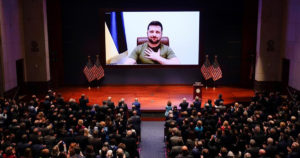
Ukrainian President Volodymyr Zelensky barely registered outside his country a month ago. Now he is globally recognized by name, by face, and by his unwavering spirit. When he speaks, we listen.
Reflecting on his extraordinary stewardship against the backdrop of my experience with the many leaders of transformation I advise, I wondered why his leadership mesmerizes us the way it does, and what other leaders of transformation can learn from him.
Transformation Isn’t Magic. But It’s Not Math Either.
Turbocharging change, whether in civil society or in organizations, requires leaders to transcend the world as they know it. It means opening themselves to new ways of listening, of seeing and of interpreting the world. New ways to sense the world around them and to feel the world inside of them.
This experience feels magical, but isn’t magic. You can learn it, but you cannot expect your rational mind and clear project plans to lead you to self-transcendence. They can’t. They won’t. Many smart people have tried to “drive” change, but their well-intended change programs fail.
Your old tools will not beckon the future.
Leaders of Transformation Are Shape-Shifters
Imagine Zelensky as an alchemist, changing form in plain sight.
In days of old, alchemists tried to turn base metals, such as lead, into precious metals, such as gold. In the lore about transmuting metals, the sorcerer turns something worthless into something priceless.
In the face of an epic crisis, a transformational leader takes a cue from the alchemical arts, turning a dire situation on its head. Catastrophe becomes opportunity. Even when the conclusion seems foregone.
With Russia’s brutal attempt to crush and subjugate Ukraine, we all knew the odds going in. Russia is 28 times larger in land and has 3.5 times the population of Ukraine. Russia’s 900,000 active-duty troops dwarf Ukraine’s 240,000. Even as Ukrainian civilians and volunteers take up arms, without outside intervention Zelensky faces near certain defeat.
Zelensky’s first leadership master stroke was to ignore the “objective assessment” of the situation, including the world’s initial impulse to write him off. He didn’t see himself as small and never positioned himself that way.
On the contrary, Zelensky created his own sense of himself and then broadcast his unflinching strength far and wide. He never tried to persuade us to give him a chance. He never sounded defensive. He simply ignored assumptions that he would fail and showed us day after day that we’d underestimated him. He saw himself as a leader who could hold his own against Russia’s Vladimir Putin, and perhaps even beat him. Now we do, too.
The emergence of the bigger, bolder Zelensky is not done by sleight of hand. He’s not bluffing or puffing or faking-it-until-he-makes-it. This boyish-faced, 45-year-old former comedian actually is staring down tanks and drones and missiles and, echoing Britain’s Winston Churchill, he vows, “We will not give up. We will not lose. We will fight to the end.”
We like rooting for underdogs. We’re happy to see David slay Goliath. What transfixes us about Zelensky, though, is not just that he’s beating Goliath. We’re watching him become Goliath.
At the start of the war, Putin seemed keen to overtake Ukraine, unseat Zelensky and install his own puppet regime. Zelensky and his citizens stood firm. Yet Zelensky did more than just resist the oncoming conqueror. He reversed their fates entirely.
Comparing Putin and Zelensky now, which leader is disgraced and which is uplifted? Whose people exude hope and whose burn with shame? Who seems big and who looks small?
Putin envisioned himself as the leader who could reshape Europe and restore the Soviet Union’s lost glory. But which leader will history remember as strong, as influential, as worthy of admiration? I’m starting to wonder: How many standing ovations can this guy in the green t-shirt get from congresses and parliaments around the world?
Like a mythic alchemist, Zelensky understands that things look one way to the naked eye but when you look closer, you reveal something else entirely. When Putin pointed at his wicked adversaries, Zelensky showed us his neighbors and friends.
Putin thought he could stroll across the border to simply seize a seemingly insignificant and isolated country. Zelensky achieved the opposite result, turning national isolation into global unity. Ukraine isn’t just less alone since Putin’s invasion. Zelensky marshaled millions and millions of people to care so much about Ukraine that international businesses fled Russia and Facebook is awash in the blue and gold of its flag. Who will be the isolated one in the end?
Zelensky’s Master Class for Leaders of Transformation
Leaders today have mandates for transformation. Whether you practice leadership in a business context, in government, at an NGO or a non-profit, whether you lead a foundation or a start-up, a newsroom, a classroom or a boardroom, you are likely expected to carry out a transformation of one kind or another.
Zelensky seems larger than life, yet the foundational wisdom of his leadership applies to all of us. His rise as a leader of peace, a protector of democratic values, and an idealist willing to fight to protect the free word, reflects his embrace of a chosen leadership identity. It is an identity no one expected from him, but he did not let other people’s limited stories about him limit his own sense of greatness. He chose to rise.
Neither Zelensky nor anyone else can “drive” this radical social change.
When a leader embraces an evolution of his identity, a shift in his form so colossal and complete in response to a need, then massive transformation happens organically and overwhelmingly all around him.